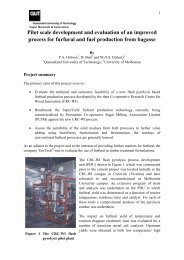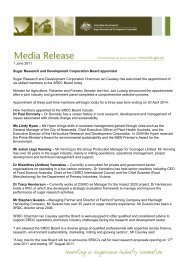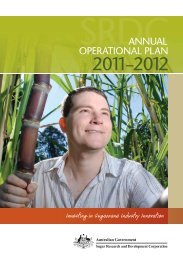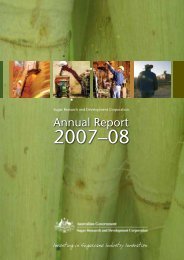Section 2 - Sugar Research and Development Corporation
Section 2 - Sugar Research and Development Corporation
Section 2 - Sugar Research and Development Corporation
You also want an ePaper? Increase the reach of your titles
YUMPU automatically turns print PDFs into web optimized ePapers that Google loves.
62<br />
<strong>Section</strong> 3<br />
SCHOLARSHIP PROJECTS<br />
The SRDC’s investment in higher education through its Scholarship Program<br />
ensures the future of the sugar industry by fostering scientifi c skills <strong>and</strong><br />
knowledge. Two scholarship projects fi nished in 2010–2011:<br />
Anna Satje<br />
Improving the cation retention capacity<br />
of tropical soils using high activity clays.<br />
<strong>Research</strong> was conducted at James Cook University<br />
to investigate whether bentonite treatments could<br />
be used to improve the fertility of low cation<br />
exchange capacities (CEC) sugar producing soils<br />
<strong>and</strong> enhance commercial cane yield.<br />
Two fi eld trials conducted in the Innisfail region<br />
in the Wet Tropics of Far North Queensl<strong>and</strong><br />
<strong>and</strong> a series of glasshouse pot trials conclusively<br />
showed that at rates of 10 – 30 t/ha b<strong>and</strong>ed<br />
additions of natural sodium bentonite improved<br />
soil properties to signifi cantly raise sugarcane<br />
yields at fi nal harvest.<br />
A subsequent economic analysis suggested that<br />
bentonite treatment could be an economically<br />
feasible option to increase sugarcane production<br />
<strong>and</strong> profi tability in the long term in permanent<br />
bed systems under PA.<br />
However, due to the high product cost of<br />
bentonite, the technique was found to be<br />
economically unfeasible in the short term <strong>and</strong> in<br />
conventional farming systems where the ground<br />
is reworked after three to four seasons.<br />
While the research concluded that bentonite<br />
treatments are not an economically feasible option<br />
for enhancing productivity for the average farmer<br />
in today’s industry, it is expected that as more<br />
growers move to permanent bed farming systems<br />
the use of bentonite to enhance soil fertility,<br />
reduce nutrient run-off <strong>and</strong> raise cane yields<br />
on low CEC soils will become common practice<br />
(STU059).<br />
Ian O’Hara<br />
Cellulosic ethanol from sugarcane bagasse in<br />
Australia: exploring industry feasibility through<br />
systems analysis, techno-economic assessment<br />
<strong>and</strong> pilot plant development.<br />
Overcoming many of the constraints to early stage<br />
investment in biofuels production from sugarcane<br />
SRDC Annual Report 2010–2011<br />
bagasse in Australia requires an underst<strong>and</strong>ing<br />
of the complex technical, economic <strong>and</strong> systemic<br />
challenges associated with the transition of<br />
established sugar industry structures from single<br />
product agribusinesses to new diversifi ed multiproduct<br />
biorefi neries.<br />
While investment decisions in new infrastructure<br />
require technically feasible solutions <strong>and</strong> the<br />
attainment of project economic investment<br />
thresholds, many other systemic factors infl uence<br />
the investment decision. These factors include<br />
the interrelationships between feedstock<br />
availability <strong>and</strong> energy use, competing product<br />
alternatives, technology acceptance <strong>and</strong><br />
perceptions of project uncertainty <strong>and</strong> risk.<br />
This thesis explored the issues surrounding<br />
the development of a cellulosic ethanol industry<br />
in Australia from sugarcane bagasse. The project<br />
developed a critical underst<strong>and</strong>ing of key drivers,<br />
risks <strong>and</strong> uncertainties that impact industry<br />
development. In doing so, the research identifi ed<br />
key factors that will lead to a profi table <strong>and</strong><br />
sustainable cellulosic biofuels industry in Australia<br />
(STU063).<br />
New postgraduate scholarships awarded<br />
Three postgraduate students were offered<br />
a SRDC scholarship to complete PhD research.<br />
Scholarships were awarded to:<br />
Anthony Brinin – who will investigate ways to<br />
decrease water content of sugarcane at harvest,<br />
which could lead to increased sugar content<br />
for mill processing.<br />
William Gilfi llan – who will research<br />
biodegradable polymer nanocomposites derived<br />
from natural fi bre <strong>and</strong> starch.<br />
Danielle Skocaj – who will analyse the latest<br />
climate forecasting data to recommend the<br />
best farm management techniques to improve<br />
sugarcane nitrogen management in the Wet<br />
Tropics.






